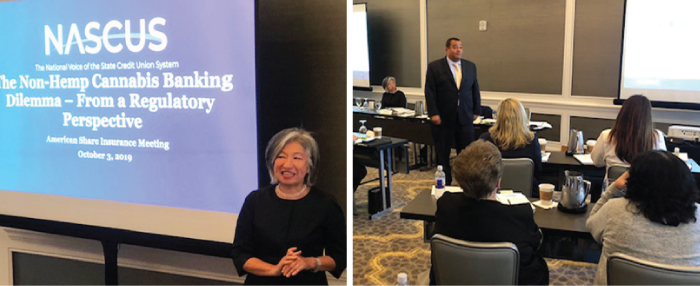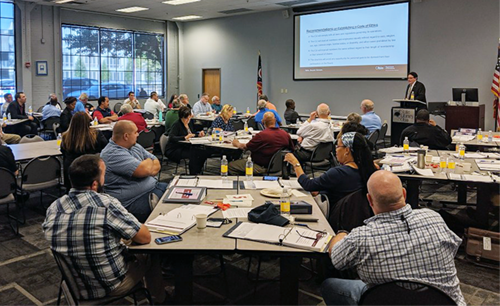Oct. 4, 2019 NASCUS Report
Posted October 4, 2019THIS WEEK: Cannabis banking bill to move in Senate? Bill sets priorities for BSA; ‘2nd Chance’ has laudable goals; Summary highlights PALS II; 1st CU Diversity, inclusion event set; TRANSITIONS: in FL; States dominate revamped bureau’s CU Advisory Council; ON THE ROAD: In OH – with directors, cannabis banking; Hurry! NASCUS 101 three weeks away; Save the date(s) for National Meeting
Signs emerge that Senate may take up cannabis-banking bill soon
Legislation passed by the House last week giving state-authorized, cannabis-related businesses access to credit union or bank services without the financial institution having to fear federal prosecution for doing so may be considered by the Senate – soon.
This week, reports indicated that Senate Banking Committee Chairman Mike Crapo (R-Idaho) took notice of the 321-103 vote in favor of the Secure and Fair Enforcement (SAFE) Banking Act (H.R. 1595). “I think there will be good support for it,” Crapo reportedly told the Washington news outlet Politico.
The House bill, as passed, would bar federal financial institution regulators from taking several actions against credit unions and banks serving legal cannabis-related businesses solely because the institutions are providing services to cannabis businesses, including prohibiting, penalizing, or discouraging a bank or credit union from providing financial services to (first) a cannabis-related legitimate business or (second) to a state (and its political subdivisions or Indian Tribe) that exercises jurisdiction over cannabis-related legitimate businesses.
However, according to press reports, Crapo has indicated he wants to add some additional provisions to the legislation – such as screening “legacy cash” that would flow into the banking system so that laundered money doesn’t flow in. Crapo also reportedly wants to address concerns about high-potency cannabis products.

(In the photo: The latest example of NASCUS’ leading outreach on cannabis banking: Left: NASCUS President and CEO Lucy Ito leads a session related to the issue for American Share Insurance this week in Dublin, Ohio. Right: NASCUS Executive VP and General Counsel Brian Knight discusses the issues with the group. See more about the session below.)
NASCUS – at least as early as five years ago — was among the first organizations representing state regulators, credit unions or financial institutions to call for clarity in federal law regarding financial institutions’ ability to serve legal marijuana businesses. Since then, in addition to adopting policy this year supporting federal safe harbor legislation on cannabis banking (such as the SAFE Banking Act), NASCUS has hosted or sponsored a host of sessions at its conferences and events about the issue – including the first two-day symposium early this past summer in Los Angeles focusing on cannabis banking.
No hearings (including markups) have been scheduled yet by Senate Banking on the SAFE Banking Act or comparable legislation.
Bill would set priorities for handling AML-CFT threats
Establishment of national exam and supervision priorities on handling anti-money laundering and combatting financing of terrorism (AML-CFT) threats to guide regulators, financial institutions and law enforcement is the aim of legislation introduced in the Senate recently.
The Improving Laundering Laws and Increasing Comprehensive Information Tracking of Criminal Activity in Shell Holdings Act (ILLICIT CASH Act, S. 2563) would also establish a financial institution liaison within the Treasury Department to “seek and receive comments from financial institutions regarding AML-CFT rules and regulations and examinations, including regarding the banking regulators.”
The bill, introduced late last week by Sen. Mark Warner (D-Va.) is co-sponsored by Sens. Tom Cotton (R-Ark.), Mike Rounds (R-S.D.), Doug Jones (D-Ala.), Bob Menendez (D-N.J.), John Kennedy (R-La.), Catherine Cortez Masto (D-Nev.) and Jerry Moran (R-Kan.).
Among other things, the bill would also require:
- Treasury and the Department of Justice to review the currency transaction report (CTR) and suspicious activity report (SAR) thresholds to determine whether any changes are necessary;
- Annual reports from Justice to Treasury on the use of BSA reporting by law enforcement and periodic law enforcement feedback to financial institutions on their SARs;
- Review and streamlining of reporting requirements to ensure a “high degree of usefulness” for CTR/SAR filings, including a review of reporting fields, as well as a review of appropriate ways to promote financial inclusions and avoid unnecessary “de-risking;”
- Establishment of a path for financial institutions to share de-identified AML-CFT information for purposes of identifying suspicious activity
The legislation was referred to the Senate Banking Committee. On a related note: NASCUS and the Credit Union Natl. Assn. (CUNA) sponsor the BSA/AML Certification Conference Nov. 18-21 in Tempe, Ariz., which offers regulators and credit unions a thorough understanding of illicit financial activities to keep credit unions compliant with the law, and their members safe.
LINKS:
Bill text for S. 2563, the ILLICIT CASH Act
Information, registration: NASCUS/CUNA BSA/AML Certfication Conference (Nov. 18-21)
‘2nd chance IRPS’ offers ‘laudable goals’
Providing additional clarity to credit unions and individuals over NCUA rules regarding statutory prohibitions of individuals from financial institution services is generally supported by NASCUS in a comment letter filed late last week. In its letter regarding the agency’s interpretive ruling and policy statement (IRPS) – known generally as the “second chance” IRPS – NASCUS wrote that providing regulatory clarity, and promoting social justice are laudable goals.
The proposal, issued in July by the agency, would update the agency’s interpretive ruling which implements section 205(d) of the Federal Credit Act by reducing the scope and number of offenses that would require an individual to apply to the agency board for permission to work (and participate in the affairs) of a federally insured credit union. Those persons have typically been convicted of a criminal offense involving dishonesty or breach of trust, or who have entered into a pretrial diversion or similar program in connection with a prosecution for such offense.
According to NCUA, the proposal is especially aimed at individuals prohibited for offenses they may have committed as youths.
“In proposing a new Interpretive Ruling and Policy Statement (proposed IRPS 19-1) NCUA has taken a measured approach that balances mitigating risk to a federally insured credit union with providing a meaningful second chance to individuals who having committed a prior indiscretion have paid their debt to society and seek gainful employment,” NASCUS wrote in its comment letter. “NASCUS agrees that NCUA’s proposed changes will bring additional clarity to credit unions and individuals subject to the FCUA sec. 205(d) framework.”
In July, when the proposal was issued, NCUA Board Chairman Rodney Hood said he was personally committed to more initiatives such as the “second chance” proposal and said to “expect more coming from this agency to work with second-chance individuals.”
LINK:
NASCUS Comments: ‘2nd Chance’ IRPS
Summary gives rundown on new PALS II for FCUs
The latest summary from NASCUS outlines the new “Payday Alternative Loans (PALS) II” final rule, which the NCUA Board adopted at its most recent board meeting last month and which applies only to federal credit unions. The new rule takes effect Dec. 2 (the Monday following Thanksgiving).
The members-only summary also notes, as NASCUS President and CEO Lucy stated in a press release after the board adopted the rule, that state-chartered credit unions should look to state law and state regulation for their ability to make these types of loans.
Under the new PALS II loan, FCUs will be permitted to provide their members “payday alternative loans” (PALs) of any amount up to $2,000, fully amortized over a term of one to 12 months. It also allows FCUs to: have a minimum term of one month with a maximum of 12 months; make a PALs II loan immediately upon the borrower’s establishing membership; and, in a restriction, offer only one type of PALs loan to a member at any given time.
The agency’s PALS II loan was adopted on a split vote of 2-1 (with Board Member Todd Harper dissenting). NCUA, in a statement upon adoption of the rule, said its new rule gives federal credit unions the ability to offer more payday alternative loan options. The rule does not replace the agency’s existing payday alternatives loan option (known as PALS I).
Agency plans first ‘Credit Union Diversity, Inclusion’ event
The first “Credit Union Diversity, Equity, and Inclusion Summit” is set for Nov. 6 by NCUA said this week, aimed at discussing how to promote those qualities at the agency and the credit unions it regulates.
The agency said the program, sponsored by NCUA, will be held at the Westin Old Town Alexandria Hotel in Alexandria, Va. Registration is at 7:30 a.m.; the program starts at 8 a.m. and is scheduled to run to 5 p.m.
In announcing the program, NCUA Board Chairman Rodney Hood noted that he has described financial inclusion as “the civil rights issue of our time.” “And by ‘inclusion,’ I mean not only broader access to affordable financial services, but also to employment and business opportunities,” he said. “Our country is going through a period of profound demographic change, and our financial system should be leading efforts to respond to that change.”
Hood and his colleagues on the NCUA Board (Members J. Mark McWatters and Todd M. Harper) will speak at the Summit, the agency said. The Summit will also include panel discussions on best practices for promoting diversity, equity, and inclusion; on recruiting and retaining a diverse workforce; and on collecting diversity data, according to NCUA.
LINK:
NCUA Hosting Diversity, Equity, and Inclusion Summit Nov. 6
States dominate membership on CFBP CU Council
Six state credit union representatives will sit on the CFPB’s Credit Union Advisory Council, out of eight total spots on the council, the bureau announced in releasing the new roster for the group Thursday. Chairing the group, which meets face-to-face three times a year and advises the agency on a “broad range of consumer financial issues and emerging market trends,” will be Sean Cahill, president and CEO of TrueSky Credit Union in Oklahoma City. The committee membership is rounded out by:
- Teresa Campbell, president and CEO, San Diego County Credit Union (San Diego, CA, a NASCUS member).
- Brian Holst, general counsel, Elevations Credit Union (Boulder, CO, also a NASCUS member).
- Doe Gregersen, vice president and general counsel, Landmark Credit Union (New Berlin, WI).
- Racardo McLaughlin, vice president mortgage originations/operations (TwinStar Credit Union, Lacey, WA).
- Rick Schmidt, president and CEO, WestStar Credit Union (Las Vegas, NV).
- Arlene Babwah, vice president risk management, Coastal Federal Credit Union (Raleigh, NC)
- Rick Durante, vice president, director of corporate social responsibility and government affairs, Franklin Mint Federal Credit Union (Chadds Ford, PA).
Holst, Durante, Gregersen and McLaughlin are new members of the council; the remaining four are continuing members.
LINK:
CFPB Announces Advisory Committee Members
TRANSITIONS: In FL, welcome to new CU bureau leader
Congratulations to Benjamin (Ben) F. Brinkley III, who is the new bureau chief of credit union regulation for the division of financial institutions at the Florida Office of Financial Regulation. A 14-year veteran of the OFR, he has served in both the credit union bureau and the agency’s banking bureau for south Florida.
ON THE ROAD: In OH — with state CU directors, talking cannabis banking

(In the photo, above) Ohio Division of Financial Institutions Deputy Superintendent Rob Rutkowski leads the discussion during this week’s Ohio Directors’ College in Columbus, jointly sponsored by the DFI and NASCUS. The one-day session brought more than 50 Ohio credit union directors and professionals to discuss key issues regarding supervision at both the state and federal levels. Later this month (Oct. 22), NASCUS hosts with the Michigan Office of Credit Unions the Michigan Industry Day in Ann Arbor. The event brings state regulators and credit unions together to share experiences and ideas about developing a stronger state credit union system in their state …
 Meanwhile, in Dublin, Ohio, NASCUS CEO Lucy Ito and Executive Vice President Brian Knight visited American Share Insurance (ASI) in Dublin, Ohio, to present to the firm’s 2019 ASI Council regarding the regulatory issues surrounding the “Non-Hemp Cannabis Banking Dilemma.” At left, NASCUS’ Lucy Ito (right) visits with Dennis Adams, CEO of ASI, and Kathy Duvall, CEO of San Francisco Fire Credit Union, San Francisco. Both ASI and SFFCU are NASCUS members.
Meanwhile, in Dublin, Ohio, NASCUS CEO Lucy Ito and Executive Vice President Brian Knight visited American Share Insurance (ASI) in Dublin, Ohio, to present to the firm’s 2019 ASI Council regarding the regulatory issues surrounding the “Non-Hemp Cannabis Banking Dilemma.” At left, NASCUS’ Lucy Ito (right) visits with Dennis Adams, CEO of ASI, and Kathy Duvall, CEO of San Francisco Fire Credit Union, San Francisco. Both ASI and SFFCU are NASCUS members.
LINK:
NASCUS ‘upcoming events’
Just three weeks away: NASCUS 101! (Sign up today!)
 Hurry to sign up for NASCUS 101, a half-hour (no charge) webinar that brings together members, prospective members or anyone else interested in NASCUS to better understand the unique tools and benefits NASCUS offers, just three weeks away. The Oct. 24, 2-2:30 p.m. ET, packed-with-information webinar program also offers attendees an opportunity to hear from their peers in NASCUS—a member network of state regulators, credit unions, credit union leagues, and other system supporters—and how they leverage their NASCUS membership. The webinar ends with a Q&A session. Advance registration required; sign up today
Hurry to sign up for NASCUS 101, a half-hour (no charge) webinar that brings together members, prospective members or anyone else interested in NASCUS to better understand the unique tools and benefits NASCUS offers, just three weeks away. The Oct. 24, 2-2:30 p.m. ET, packed-with-information webinar program also offers attendees an opportunity to hear from their peers in NASCUS—a member network of state regulators, credit unions, credit union leagues, and other system supporters—and how they leverage their NASCUS membership. The webinar ends with a Q&A session. Advance registration required; sign up today
LINK:
Agenda, registration for Oct. 24 NASCUS 101 webinar (no charge)
‘National Meeting’ for state regulators set for March 16-17
State regulators should save the dates of March 16-17, 2020 for the annual NASCUS State Credit Union Regulators National Meeting, set for New Orleans. The regulators-only meeting brings the state supervisors together for two days of examining the issues, topics and trends resonating through the state credit union regulatory environment today, with an eye toward the year ahead. Past meetings have looked at such hot topics as credit union growth through acquisition of banks and other financials, cannabis banking, NCUA’s Modern Examination and Risk Identification Tool (MERIT) exam platform, real estate appraisal requirements, the role for corporate credit unions, evolution of digital currency – and more. Registration for the meeting, set for the Sheraton New Orleans hotel, is now open.
LINK:
State CU Regulators National Meeting, March 16-17 (New Orleans)
For more information about NASCUS's news and/or public relations, please contact our Marketing and Communications Department.